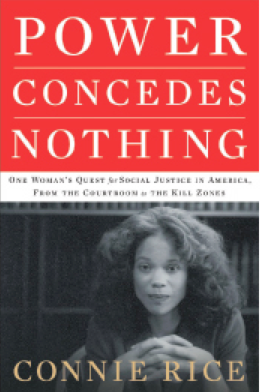Editor’s Note: In recognition of the Los Angeles Times Festival of Books that takes place on the campus of the University of Southern California this weekend, I am posting my review of Connie Rice’s book, Power Concedes Nothing. Rice will appear on a panel at Bovard Auditorium, Sunday at 11 am, discussing the Los Angeles riots twenty years later along with Los Angeles Times editor Jim Newton, former LA DA Gil Garcetti and KCRW Host Warren Olney. If you want something on a lighter vein stop by Booth #953 where I will be hanging out with some mystery writers selling my book, Lincoln’s Hand.
Los Angeles civil rights attorney Connie Rice has traveled both sides of the city’s mean streets. To the gangs of South Central LA she was the “Lady Lawyer” trying to end the violence. To the LAPD she was first a tormentor with multi lawsuits demanding justice for her clients, then as a mediator between the cops on the street and the LAPD brass through the department’s most trying period of transformation from the Rodney King beating to the Rampart scandal to the reforms of Chief Bill Bratton. In her newly published book, Power Concedes Nothing, One Woman’s Quest for Social Justice in America from the Kill Zones to the Courtroom she tells her remarkable story.
 I interviewed Rice about her book at a recent Milken Institute event. We talked about some of the stories in her book: the social justice campaigns, work involving the LAPD and even her relationship with her cousin, Condoleeza Rice, the former U.S. Secretary of State.
I interviewed Rice about her book at a recent Milken Institute event. We talked about some of the stories in her book: the social justice campaigns, work involving the LAPD and even her relationship with her cousin, Condoleeza Rice, the former U.S. Secretary of State.
My first question to her was first asked of Rice by a young boy who, many years ago, couldn’t figure from her looks who the young Connie Rice was. He asked her: What is you?
This question started the twelve-year old Rice to thinking about herself and her place in the world. To Connie, the African-American boy asked the girl he could not identify by looks where she fit in.
Connie Rice is a model for America’s motto, E Pluribus Unum: out of many one. As she wrote, “It is easier for the great-great-granddaughter of Native Americans, and the great granddaughter of African slaves and European slave owners, to reconcile our nation’s cruel beginnings with love of America’s promise.”
Her life has been dedicated to pursuing that promise.
Rice offers stories of dealing with the cruelty of gang culture and attempts to break that culture. Those efforts brought strange requests such as the time a Crips gang member asked her if she could provide a copy of the “agreement between the Arabs and the Jews.”
He was referring to the Israeli-Egyptian Sinai accords. He figured if that treaty could bring the Arabs and Israelis together, it could do the same for the Crips and Bloods.
If only it were that easy.
Rice tells chilling stories of gang culture such as meeting a nine-year boy she labels Pygmy who older gang members turn into a killer with “soulless eyes … a child who died with his targets.”
Rice details here journey with the LAPD and law enforcement from an adversary to an ally helping Chief Bill Bratton change the culture of the department.
As Sheriff Lee Baca said of Rice, “Connie sues you to let you know she wants a relationship.”
From being bodily thrown out of a Police Protective League meeting to responding to a call from the League to make sure the average officers on the street were not scapegoats for some of the department problems, the journey traveled down a wild and winding road.
Rice refuses to identify with any political party, but she has attracted a wide array of blurbs supporting her book from notable people that cross the political spectrum: PBS commentator Tavis Smiley, Princeton University civil rights professor Cornel West, Chief Bill Bratton, retired U.S. Army general Stanley McChrystal and cousin Condoleeza.
I asked Rice what she talks about politically with her cousin. She says they don’t talk about politics. “Maybe one day we will. It would be an interesting debate.”
That’s an understatement.
Connie Rice set her life goal to make a difference and her story shows that she achieved overwhelmingly.
In the book, you’ll also learn a little about the personal side of this strong willed advocate. She calls herself a Nieman-Marxist. It’s about the shoes.
Learn more about Power Concedes Nothing at this website.
The Milken Institute site offers a video of my entire interview with Connie Rice here.
Originally published in Business Life.com

